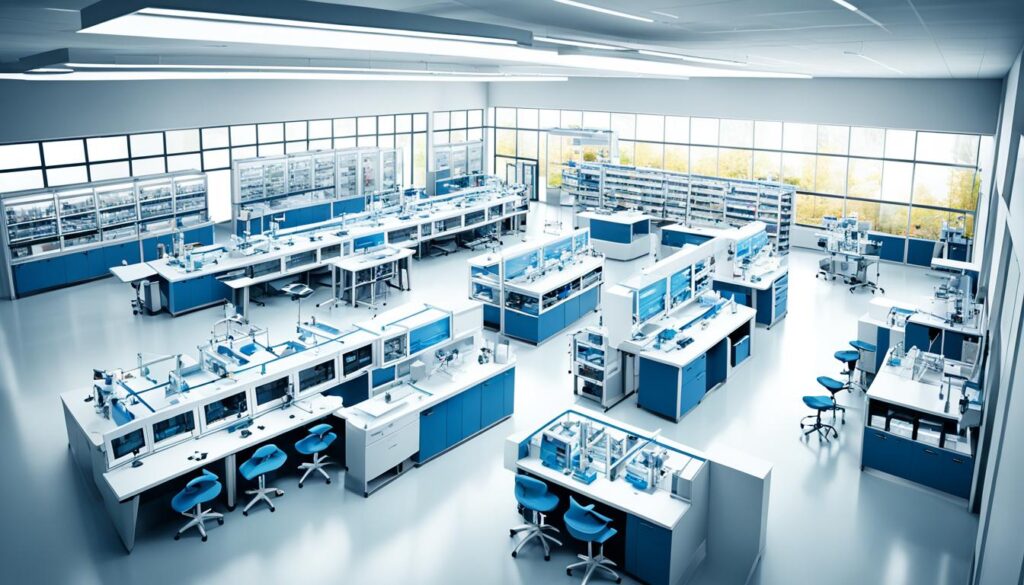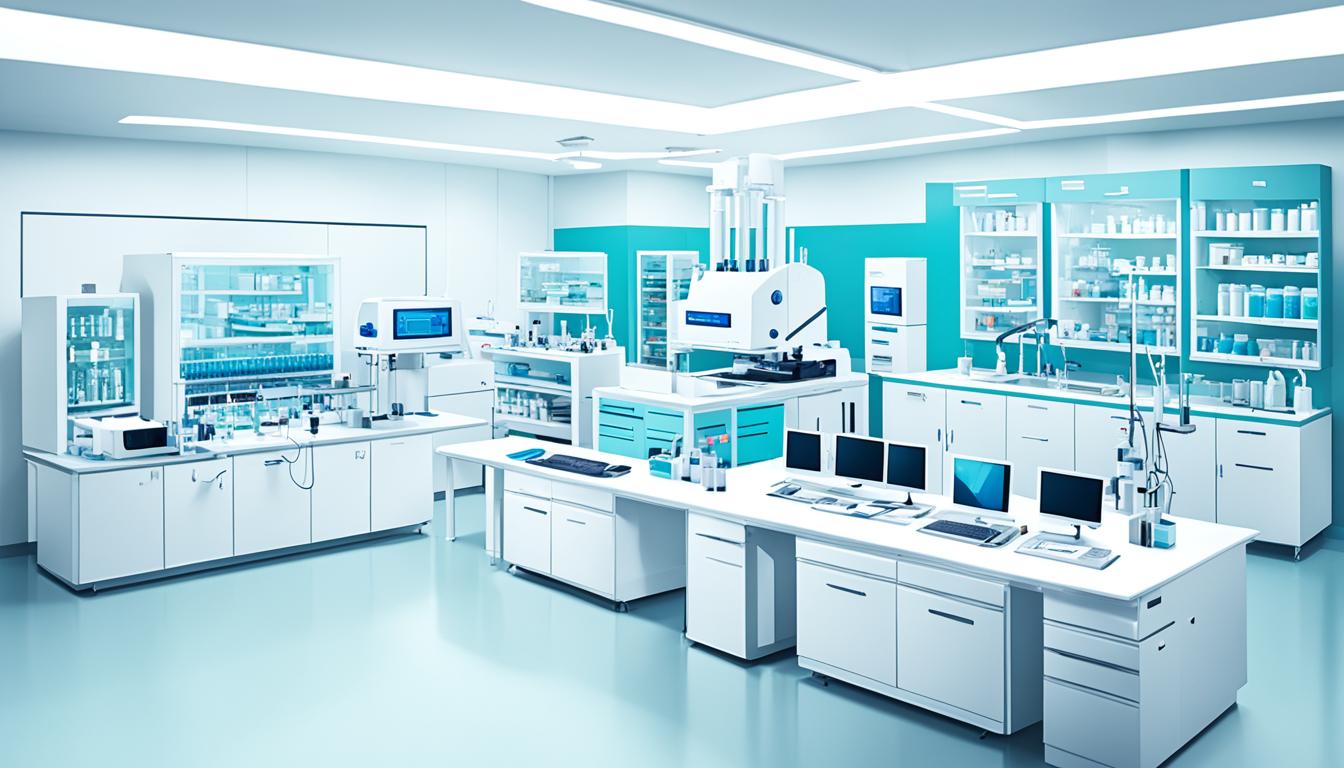Starting a lab testing business is an exciting venture in healthcare. With the growing need for medical diagnostics, now is a perfect time to dive in. You’ll go through steps from planning to execution to set up a successful lab testing facility.
To start, you need a solid business plan, the right certifications, and good lab management software. These are the basics of your business. You’ll need to plan carefully, from picking the right location to hiring skilled people.
As you start, remember that medical labs are key in healthcare. Your lab will help doctors diagnose and treat patients. This job needs careful attention and strict standards.
Key Takeaways
- Develop a comprehensive business plan
- Obtain required lab testing certifications
- Invest in quality lab management software
- Choose a suitable location for your lab
- Hire skilled professionals for your team
- Ensure compliance with healthcare regulations
- Focus on providing accurate and timely results
Understanding the Lab Testing Industry
The lab testing industry is key to modern healthcare. It’s vital to understand its importance and the current state as you think about starting a lab testing business.
The importance of medical laboratories in healthcare
Medical labs are crucial for making accurate diagnoses. They give doctors the info they need to treat patients right. From simple blood tests to complex genetic tests, these labs are essential for patient care.
Current market trends and opportunities
The lab testing market is growing fast, thanks to new tech and a focus on preventive care. This growth means new businesses can join the field. Starting a laboratory testing business could be a great choice if you’re willing to put in the effort.
Types of lab testing services
Lab testing services include many specialties, such as:
- Clinical testing
- Research and development
- Specialized diagnostics
- Environmental testing
When planning your business, think about what areas you want to focus on. Remember, safety rules are key in all testing services. You’ll need to work with trusted suppliers for lab equipment to meet all standards and rules.
Developing a Solid Business Plan
A well-crafted business plan is key for your lab testing venture. It acts as a roadmap, guiding you through the complex steps of starting and running a successful laboratory. Your plan should detail your vision, goals, and how to reach them.
Key Components of a Lab Testing Business Plan
Your business plan should include:
- Executive summary
- Company description
- Services offered
- Market analysis
- Lab marketing strategies
- Operational plan
- Financial projections
Conducting Market Research and Analysis
Doing market research is vital. It helps you know your target audience, competitors, and trends in the industry. This info is key for making strong lab marketing strategies. Find niches and unique selling points to stand out in the competitive market.

Financial Projections and Budgeting
Make detailed financial plans for the next five years. Include costs for starting up, running, and making money. Think about different ways to finance your lab. Your budget should cover equipment, facilities, staff, and marketing.
Creating a solid business plan sets a strong base for your lab testing business. This plan will guide your choices and be very useful when looking for investors or loans.
Legal Requirements and Certifications
Starting a lab testing business means you have to follow strict laws and get the right certifications. Your lab must meet state and federal standards to keep people safe and offer top-notch service.
Getting lab testing certifications is key to showing you’re serious about quality. Think about getting accredited by groups like the College of American Pathologists (CAP) or Clinical Laboratory Improvement Amendments (CLIA). These certifications boost your reputation and make sure your lab meets the industry’s best practices.
Following lab safety rules is a must. You need to have strict rules for handling dangerous stuff, keeping your gear in good shape, and protecting your team and patients. This means proper waste disposal, safety training, and keeping accurate records. Starting a laboratory testing business means knowing these rules well to avoid legal trouble and keep things running smoothly.
To start, do the following:
- Look into state and federal licensing needs
- Get the permits and licenses you need
- Put safety rules in place and train your team
- Go for the right lab testing certifications
- Set up a system for keeping accurate records
By focusing on following the law and getting the right certifications, you’ll lay a solid base for your lab testing business. This ensures it does well in the long run and is respected in the healthcare field.
Securing Funding for Your Lab Testing Business
Starting a lab testing business takes a lot of money. Knowing about lab financing options and marketing strategies can help you get the funds you need.
Exploring financing options
Here are some ways to fund your lab:
- Self-funding: Use your savings or assets to invest in your business
- Angel investors: Present to wealthy people who like to back startups
- Venture capital: Look for funding from firms that focus on growing businesses
- Business loans: Try for loans from banks or SBA-backed options
Attracting investors and venture capital
To draw in investors, make a strong pitch. Talk about what makes your lab special, the big market chance, and how you plan to grow. Make your presentations look good and practice your speech to impress.
Applying for business loans
For loans, have a detailed business plan and financial forecasts ready. Banks will look at your credit score and if your lab business idea is solid. Be prepared to offer collateral and personal guarantees for the loan.
Also, mix in lab marketing strategies with your funding plans. A good marketing plan shows you can bring in clients and make money. This makes your lab more appealing to investors and lenders.
How to Start a Lab Testing Business: Step-by-Step Guide
Starting a lab testing business needs careful planning and action. Follow these steps to make your venture a success:
- Develop a comprehensive business plan
- Choose a legal structure for your business
- Secure funding through loans or investors
- Find a suitable facility that meets regulatory requirements
- Purchase necessary equipment and supplies
- Implement lab management software for efficient operations
- Hire qualified staff and establish standard operating procedures
- Build relationships with referring physicians
- Ensure compliance with all relevant regulations
- Market your lab testing services to potential clients
Using lab management software is key to making your lab run smoothly. This tech helps manage patient data, track samples, and create reports well. Look for software that’s easy to use, can grow with your business, and works well with other systems.
Starting a lab testing business means paying attention to details and following strict quality standards. Keep up with industry trends and always look for ways to improve your services. This will help you stay ahead in the market.
Choosing the Right Location and Facility
Finding the perfect spot for your lab is crucial for success. It should be easy to get to and near healthcare centers. Let’s look at what to consider when setting up your lab.
Selecting a Lab Site
Think about these points when picking a location:
- How easy it is for people to get there
- If it’s near hospitals or doctor’s offices
- What the local rules say about running a lab
Planning Your Space
Your lab needs room to grow. Plan for more space than you think you’ll need now. This lets you add more equipment later without moving. A good layout helps your team work better too.

Getting the Right Utilities
Labs need special utilities to work well. You’ll want to check for:
- Lots of electrical power
- Special sinks for washing hands
- Safety showers in case of spills
Talk to laboratory equipment suppliers about setting up your lab. They can help you follow safety rules and make sure your lab works well. Remember, a well-planned lab keeps your team safe and helps you do your best work.
Equipping Your Laboratory
Starting a lab testing business means picking the right equipment and following strict protocols. Your success depends on having the best tools and sticking to the right steps.
When picking suppliers for your lab gear, choose ones known for quality. They should offer everything from top-notch microscopes to dependable centrifuges and analyzers. Think about new gear with warranties and used items from other sellers to save money without sacrificing quality.
It’s key to have solid lab sample handling rules for reliable results and quality checks. Make sure you have clear steps for collecting, storing, and processing samples. Train your team well on these steps to keep your tests consistent and trustworthy.
Don’t overlook the office side of your lab. Spend on ergonomic office gear and special software for billing, reporting, and managing data. These tools will make your lab run smoothly and help you start a successful DNA testing business or other lab testing venture.
- Research reputable laboratory equipment suppliers
- Develop comprehensive lab sample handling protocols
- Invest in administrative tools and software
By setting up your lab right and following strict rules, you’re laying a solid base for your business. This focus on details will lead to accurate results and happy clients.
Building a Skilled Team and Operational Procedures
Your lab testing business needs a top-notch team to succeed. Start by hiring qualified staff, including lab technicians, phlebotomists, and administrative personnel. Put a strong emphasis on lab technician training to keep your team up-to-date with the latest techniques and technologies.
Creating robust lab quality control procedures is crucial for maintaining accuracy and reliability in your test results. Set up standard operating protocols that guide your team through each step of the testing process. This approach helps minimize errors and ensures consistent, high-quality output.
Don’t forget to invest in ongoing staff development. Regular training sessions and workshops can help your team stay sharp and adapt to new industry trends. You might even consider partnering with laboratory consulting firms to streamline your hiring process and access top talent in the field.
By focusing on building a skilled team and implementing strong operational procedures, you’ll set your lab testing business up for long-term success. Remember, your staff is your most valuable asset, so invest in them wisely.
FAQ
What are the key steps to start a lab testing business?
What are some important legal requirements and certifications needed for a lab testing business?
How can I secure funding for my lab testing business?
What factors should I consider when choosing a location and facility for my lab?
How do I ensure proper lab sample handling and quality control procedures?
What kind of staff should I hire for my lab testing business?
Author
-

Lucas Martinez is an accomplished entrepreneur with a passion for startups. He has launched and scaled multiple businesses, providing pragmatic advice on starting and growing a business.
View all posts



